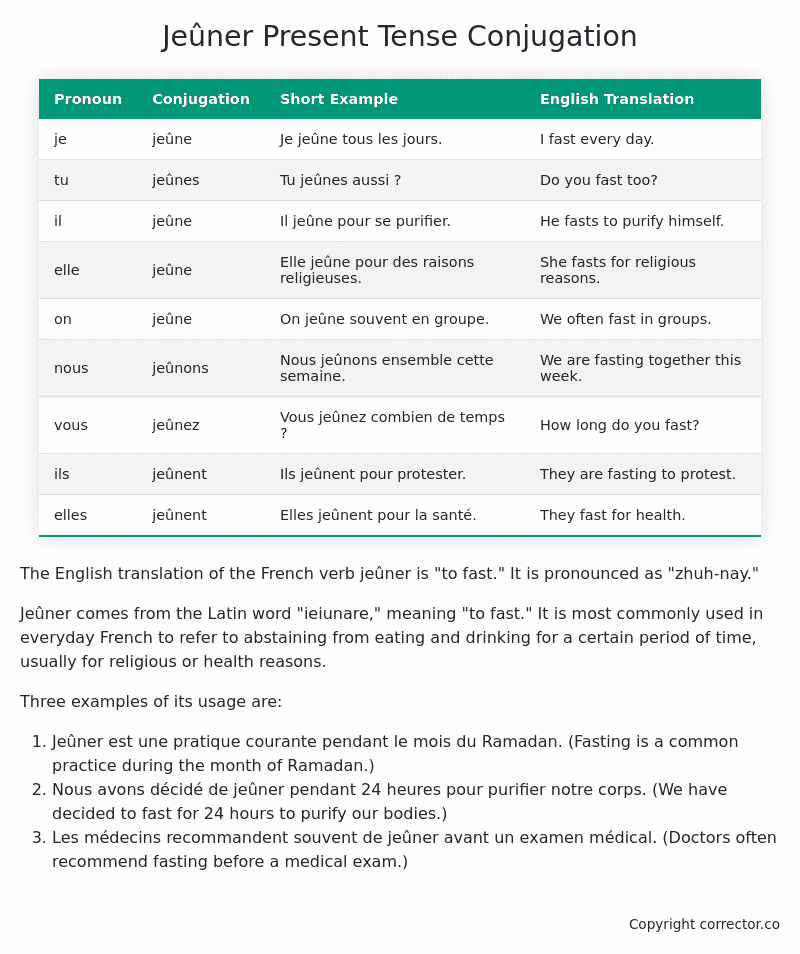Le Present (Present Tense) Conjugation of the French Verb jeûner
Introduction to the verb jeûner
The English translation of the French verb jeûner is “to fast.” It is pronounced as “zhuh-nay.”
Jeûner comes from the Latin word “ieiunare,” meaning “to fast.” It is most commonly used in everyday French to refer to abstaining from eating and drinking for a certain period of time, usually for religious or health reasons.
Three examples of its usage are:
- Jeûner est une pratique courante pendant le mois du Ramadan. (Fasting is a common practice during the month of Ramadan.)
- Nous avons décidé de jeûner pendant 24 heures pour purifier notre corps. (We have decided to fast for 24 hours to purify our bodies.)
- Les médecins recommandent souvent de jeûner avant un examen médical. (Doctors often recommend fasting before a medical exam.)
Jeûner – About the French Present Tense
To take a deep dive into all the French tenses then see our article on Mastering French Tense Conjugation.
Common Everyday Usage Patterns For Le Present
Interactions with Other Tenses
Table of the Present Tense Conjugation of jeûner
| Pronoun | Conjugation | Short Example | English Translation |
|---|---|---|---|
| je | jeûne | Je jeûne tous les jours. | I fast every day. |
| tu | jeûnes | Tu jeûnes aussi ? | Do you fast too? |
| il | jeûne | Il jeûne pour se purifier. | He fasts to purify himself. |
| elle | jeûne | Elle jeûne pour des raisons religieuses. | She fasts for religious reasons. |
| on | jeûne | On jeûne souvent en groupe. | We often fast in groups. |
| nous | jeûnons | Nous jeûnons ensemble cette semaine. | We are fasting together this week. |
| vous | jeûnez | Vous jeûnez combien de temps ? | How long do you fast? |
| ils | jeûnent | Ils jeûnent pour protester. | They are fasting to protest. |
| elles | jeûnent | Elles jeûnent pour la santé. | They fast for health. |
Other Conjugations for Jeûner.
Le Present (Present Tense) Conjugation of the French Verb jeûner (this article)
Imparfait (Imperfect) Tense Conjugation of the French Verb jeûner
Passé Simple (Simple Past) Tense Conjugation of the French Verb jeûner
Passé Composé (Present Perfect) Tense Conjugation of the French Verb jeûner
Futur Simple (Simple Future) Tense Conjugation of the French Verb jeûner
Futur Proche (Near Future) Tense Conjugation of the French Verb jeûner
Plus-que-parfait (Pluperfect) Tense Conjugation of the French Verb jeûner
Passé Antérieur (Past Anterior) Tense Conjugation of the French Verb jeûner
Futur Antérieur (Future Anterior) Tense Conjugation of the French Verb jeûner
Subjonctif Présent (Subjunctive Present) Tense Conjugation of the French Verb jeûner
Subjonctif Passé (Subjunctive Past) Tense Conjugation of the French Verb jeûner
Subjonctif Imparfait (Subjunctive Imperfect) Tense Conjugation of the French Verb jeûner
Subjonctif Plus-que-parfait (Subjunctive Pluperfect) Tense Conjugation of the French Verb jeûner
Conditionnel Présent (Conditional Present) Tense Conjugation of the French Verb jeûner
Conditionnel Passé (Conditional Past) Tense Conjugation of the French Verb jeûner
L’impératif Présent (Imperative Present) Tense Conjugation of the French Verb jeûner
L’infinitif Présent (Infinitive Present) Tense Conjugation of the French Verb jeûner
Struggling with French verbs or the language in general? Why not use our free French Grammar Checker – no registration required!
Get a FREE Download Study Sheet of this Conjugation 🔥
Simply right click the image below, click “save image” and get your free reference for the jeûner Present Tense tense conjugation!

I hope you enjoyed this article on the verb jeûner. Still in a learning mood? Check out another TOTALLY random French verb present conjugation!


